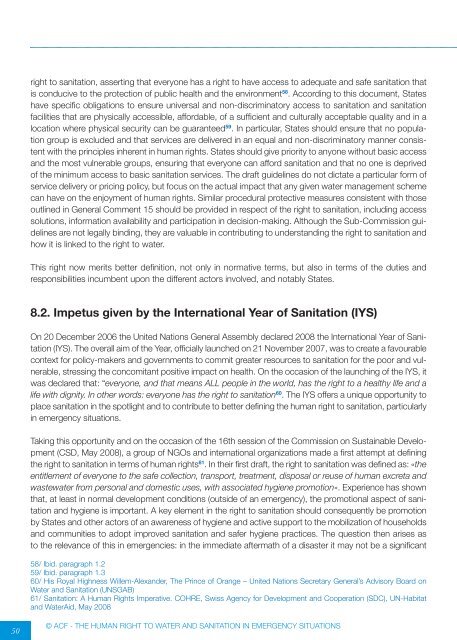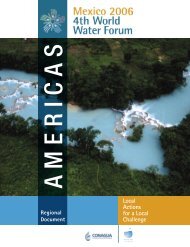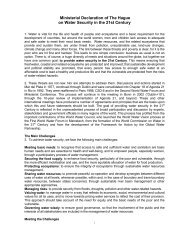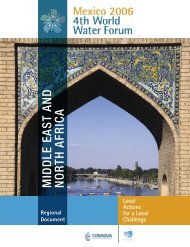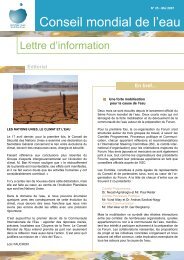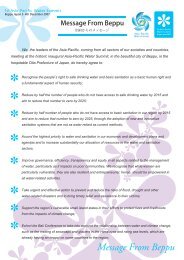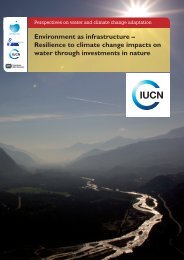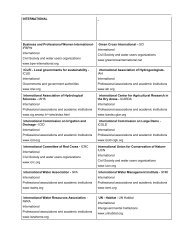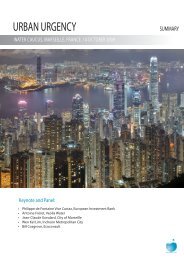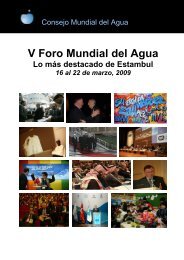the human right to water and sanitation in emergency situations
the human right to water and sanitation in emergency situations
the human right to water and sanitation in emergency situations
Create successful ePaper yourself
Turn your PDF publications into a flip-book with our unique Google optimized e-Paper software.
50<br />
<strong>right</strong> <strong>to</strong> <strong>sanitation</strong>, assert<strong>in</strong>g that everyone has a <strong>right</strong> <strong>to</strong> have access <strong>to</strong> adequate <strong>and</strong> safe <strong>sanitation</strong> that<br />
is conducive <strong>to</strong> <strong>the</strong> protection of public health <strong>and</strong> <strong>the</strong> environment 58 . Accord<strong>in</strong>g <strong>to</strong> this document, States<br />
have specific obligations <strong>to</strong> ensure universal <strong>and</strong> non-discrim<strong>in</strong>a<strong>to</strong>ry access <strong>to</strong> <strong>sanitation</strong> <strong>and</strong> <strong>sanitation</strong><br />
facilities that are physically accessible, affordable, of a sufficient <strong>and</strong> culturally acceptable quality <strong>and</strong> <strong>in</strong> a<br />
location where physical security can be guaranteed 59 . In particular, States should ensure that no population<br />
group is excluded <strong>and</strong> that services are delivered <strong>in</strong> an equal <strong>and</strong> non-discrim<strong>in</strong>a<strong>to</strong>ry manner consistent<br />
with <strong>the</strong> pr<strong>in</strong>ciples <strong>in</strong>herent <strong>in</strong> <strong>human</strong> <strong>right</strong>s. States should give priority <strong>to</strong> anyone without basic access<br />
<strong>and</strong> <strong>the</strong> most vulnerable groups, ensur<strong>in</strong>g that everyone can afford <strong>sanitation</strong> <strong>and</strong> that no one is deprived<br />
of <strong>the</strong> m<strong>in</strong>imum access <strong>to</strong> basic <strong>sanitation</strong> services. The draft guidel<strong>in</strong>es do not dictate a particular form of<br />
service delivery or pric<strong>in</strong>g policy, but focus on <strong>the</strong> actual impact that any given <strong>water</strong> management scheme<br />
can have on <strong>the</strong> enjoyment of <strong>human</strong> <strong>right</strong>s. Similar procedural protective measures consistent with those<br />
outl<strong>in</strong>ed <strong>in</strong> General Comment 15 should be provided <strong>in</strong> respect of <strong>the</strong> <strong>right</strong> <strong>to</strong> <strong>sanitation</strong>, <strong>in</strong>clud<strong>in</strong>g access<br />
solutions, <strong>in</strong>formation availability <strong>and</strong> participation <strong>in</strong> decision-mak<strong>in</strong>g. Although <strong>the</strong> Sub-Commission guidel<strong>in</strong>es<br />
are not legally b<strong>in</strong>d<strong>in</strong>g, <strong>the</strong>y are valuable <strong>in</strong> contribut<strong>in</strong>g <strong>to</strong> underst<strong>and</strong><strong>in</strong>g <strong>the</strong> <strong>right</strong> <strong>to</strong> <strong>sanitation</strong> <strong>and</strong><br />
how it is l<strong>in</strong>ked <strong>to</strong> <strong>the</strong> <strong>right</strong> <strong>to</strong> <strong>water</strong>.<br />
This <strong>right</strong> now merits better def<strong>in</strong>ition, not only <strong>in</strong> normative terms, but also <strong>in</strong> terms of <strong>the</strong> duties <strong>and</strong><br />
responsibilities <strong>in</strong>cumbent upon <strong>the</strong> different ac<strong>to</strong>rs <strong>in</strong>volved, <strong>and</strong> notably States.<br />
8.2. Impetus given by <strong>the</strong> International Year of Sanitation (IYS)<br />
On 20 December 2006 <strong>the</strong> United Nations General Assembly declared 2008 <strong>the</strong> International Year of Sanitation<br />
(IYS). The overall aim of <strong>the</strong> Year, officially launched on 21 November 2007, was <strong>to</strong> create a favourable<br />
context for policy-makers <strong>and</strong> governments <strong>to</strong> commit greater resources <strong>to</strong> <strong>sanitation</strong> for <strong>the</strong> poor <strong>and</strong> vulnerable,<br />
stress<strong>in</strong>g <strong>the</strong> concomitant positive impact on health. On <strong>the</strong> occasion of <strong>the</strong> launch<strong>in</strong>g of <strong>the</strong> IYS, it<br />
was declared that: “everyone, <strong>and</strong> that means ALL people <strong>in</strong> <strong>the</strong> world, has <strong>the</strong> <strong>right</strong> <strong>to</strong> a healthy life <strong>and</strong> a<br />
life with dignity. In o<strong>the</strong>r words: everyone has <strong>the</strong> <strong>right</strong> <strong>to</strong> <strong>sanitation</strong> 60 . The IYS offers a unique opportunity <strong>to</strong><br />
place <strong>sanitation</strong> <strong>in</strong> <strong>the</strong> spotlight <strong>and</strong> <strong>to</strong> contribute <strong>to</strong> better def<strong>in</strong><strong>in</strong>g <strong>the</strong> <strong>human</strong> <strong>right</strong> <strong>to</strong> <strong>sanitation</strong>, particularly<br />
<strong>in</strong> <strong>emergency</strong> <strong>situations</strong>.<br />
Tak<strong>in</strong>g this opportunity <strong>and</strong> on <strong>the</strong> occasion of <strong>the</strong> 16th session of <strong>the</strong> Commission on Susta<strong>in</strong>able Development<br />
(CSD, May 2008), a group of NGOs <strong>and</strong> <strong>in</strong>ternational organizations made a first attempt at def<strong>in</strong><strong>in</strong>g<br />
<strong>the</strong> <strong>right</strong> <strong>to</strong> <strong>sanitation</strong> <strong>in</strong> terms of <strong>human</strong> <strong>right</strong>s 61 . In <strong>the</strong>ir first draft, <strong>the</strong> <strong>right</strong> <strong>to</strong> <strong>sanitation</strong> was def<strong>in</strong>ed as: «<strong>the</strong><br />
entitlement of everyone <strong>to</strong> <strong>the</strong> safe collection, transport, treatment, disposal or reuse of <strong>human</strong> excreta <strong>and</strong><br />
waste<strong>water</strong> from personal <strong>and</strong> domestic uses, with associated hygiene promotion». Experience has shown<br />
that, at least <strong>in</strong> normal development conditions (outside of an <strong>emergency</strong>), <strong>the</strong> promotional aspect of <strong>sanitation</strong><br />
<strong>and</strong> hygiene is important. A key element <strong>in</strong> <strong>the</strong> <strong>right</strong> <strong>to</strong> <strong>sanitation</strong> should consequently be promotion<br />
by States <strong>and</strong> o<strong>the</strong>r ac<strong>to</strong>rs of an awareness of hygiene <strong>and</strong> active support <strong>to</strong> <strong>the</strong> mobilization of households<br />
<strong>and</strong> communities <strong>to</strong> adopt improved <strong>sanitation</strong> <strong>and</strong> safer hygiene practices. The question <strong>the</strong>n arises as<br />
<strong>to</strong> <strong>the</strong> relevance of this <strong>in</strong> emergencies: <strong>in</strong> <strong>the</strong> immediate aftermath of a disaster it may not be a significant<br />
58/ Ibid. paragraph 1.2<br />
59/ Ibid. paragraph 1.3<br />
60/ His Royal Highness Willem-Alex<strong>and</strong>er, The Pr<strong>in</strong>ce of Orange – United Nations Secretary General’s Advisory Board on<br />
Water <strong>and</strong> Sanitation (UNSGAB)<br />
61/ Sanitation: A Human Rights Imperative. COHRE, Swiss Agency for Development <strong>and</strong> Cooperation (SDC), UN-Habitat<br />
<strong>and</strong> WaterAid, May 2008<br />
© ACF - THE HUMAN RIGHT TO WATER AND SANITATION IN EMERGENCY SITUATIONS


